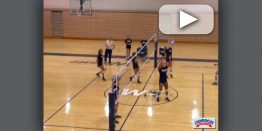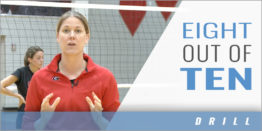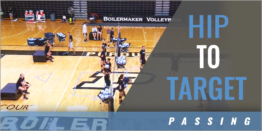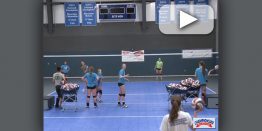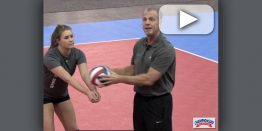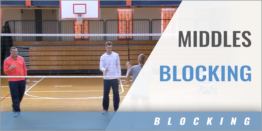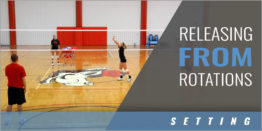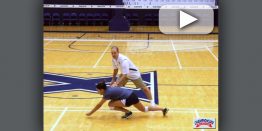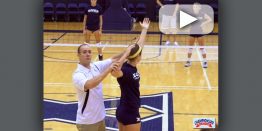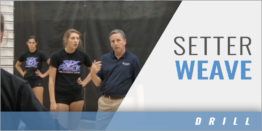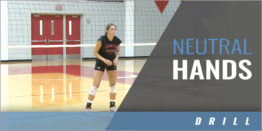Watch as Coach Shelton Collier explains and players demonstrate this Ball Handling Drill.
Setting: 8 out of 10 Drill with Lizzy Stemke – Univ. of Georgia
Watch as Coach Lizzy Stemke explains and a setter demonstrates this 8 out of 10 Drill.
Mind Games – Recognizing and Handling Concussions
FAST FACTS: Concussions can occur in any sport. A concussion is a brain injury and all are serious. Most concussions occur without loss of consciousness. Recognition and proper response to concussions when they first occur can…
Box Series: Hip to Target Drill with Dave Shondell – Purdue Univ.
Watch as Purdue Assistant Coaches explain and players demonstrate the Hip to Target Drill.
Drop Off Defense – Mike Lingenfelter – Munciana Samurai
Watch as Coach Mike Lingenfelter explains and his squad demonstrates this Drop Off Defense Drill.
Four Person Pepper – Ball Handling Drill
Because this drill is more game-like than the often-seen three-person pepper, it is an effective warm-up drill. Purpose: To use a game-like ball-control drill as a means of warming up. Setup: The court is split lengthwise using…
The Art of Strategy and Tactics in Volleyball
Strategy without tactics is the slowest route to victory. Tactics without strategy is the noise before defeat. – Sun Tzu, The Art of War. When I was coaching women’s volleyball at the University of Nebraska I had a strategy that was the…
Visual Training – Blind Spot – Walt Ker – Legacy Volleyball Club
Watch as Coach Walt Ker explains and players demonstrate proper passing techniques to eliminate the blind spot.
Attacking Drill – You Go – I Throw – Kevin Hambly – Univ. of IL
Watch as Coach Kevin Hambly explains and players demonstrate this Attacking Drill – You Go – I Throw.
30 in a Row Warm Up Drill – Abbey Sutherland – UW-Stevens Point
Watch as Coach Abbey Sutherland explains and players demonstrate this 30 in a Row Warm Up Drill.
A New Coaching Education Initiative
Performance Conditioning Volleyball is celebrating our 20th year as being the “Official Licensed Publication” of the American Volleyball Coaches Association. We are truly grateful for this long-standing relationship and providing the very best…
Middles Blocking: First Step Drill with Dennis Hohenshelt – Univ. of Virginia
Watch as Coach Dennis Hohenshelt explains and middles demonstrate this Blocking – First Step Drill.
The Cure for PTSD (Play Time Stress Disorder)
I hear it often amongst my coaching colleagues. The constant battle coaches have with players, parents and administrators over how to deal with playing time. Most parents claim to have an unbiased opinion but we all know the truth behind…
Creating Team Trust
The trusting person does the right thing even when no one is watching. Trust means doing what you are supposed to do even when you don’t want to do it. Underneath the search for trust in team sports lies a nucleus of trust-enabling…
Band Work – Kirsten Bernthal Booth – Creighton Univ.
Watch as Coach Kirsten Bernthal Booth explains and players demonstrate these Band Work Drills.
Setters: Releasing From Rotations with Bryan Bunn
Watch as Coach Bryan Bunn explains and players demonstrate Releasing From Rotations.
Floor Skills – Sprawling – Mike Johnson
Watch as Coach Mike Johnson explains and a player demonstrates proper technique when sprawling.
Does Traditional Periodization Face Extinction in Today’s Volleyball Club Play?
The traditional periodization model of a year-round off-, pre- and in-season conditioning isn’t practiced in today’s club volleyball. In a recent edition of my column (titled ‘Addressing the Over-the-Top Culture in Volleyball’) we looked at the…
Defense – Reading the Attacker – Mike Johnson
Watch as Coach Mike Johnson explains and players demonstrate this Reading the Attacker Drill.
Setter Weave Drill with Tom Keating
Watch as Coach Tom Keating explains and players demonstrate this Setter Weave Drill.
Drills I Use – To Make My Team Better
I thought I’d take a moment away from philosophical writings to give you some meat and potatoes. I have heard a lot of coaches speak over the years. What I like the most is getting something that I can take back with me to the court and put into…
Setting: Neutral Hands Drill with Lizzy Stemke – Univ. of Georgia
Watch as Coach Lizzy Stemke explains and a setter demonstrates this Neutral Hands Drill.
How to Prevent In-Season Volleyball Injuries
Overuse injuries can and most likely will happen in volleyball. These injuries are common and need to be understood, along with preventive measures and/or corrective strategies to overcome and minimize injuries and any future damage…
Partners Passing Drill with Kirsten Bernthal Booth – Creighton Univ.
Watch as Coach Kirsten Bernthal Booth explains and players demonstrate this Partners Passing Drill.
Family Matters: Anne Kordes
In a perfect world, everyone would work for Google or Facebook. Besides the free gourmet meals at lunch, in-office massages and liberal work-from-home policies, the folks at Facebook who want to start families automatically…
Setting High Balls with Kevin Hambly – Univ. of Illinois
Watch as Coach Kevin Hambly explains and a player demonstrates Setting High Balls Technique.
Avoiding player feedback dependence
The other day I came across the following question from a fellow volleyball coach: What do you do to make sure your players don’t become dependent on you for feedback in matches? This sort of thing is a significant touch point…
Outside Hitters Drills with Russ Rose – Penn State
Watch as Coach Russ Rose discusses and players demonstrate these Outside Hitters Drills.
Identify and Develop: Cultivating Leadership
Coming off one of our worst seasons our staff has had in 10 years, we were frustrated. We didn’t understand why we struggled on the court during the sea-son. Why didn’t leaders emerge? We weren’t holding one another accountable and it really…
Pepper Pros and Cons
Some in the volleyball community have weighed in with their thoughts of our game’s most popular drill. An advantage basketball has over volleyball is the simplicity of a ball, a hoop, and any number from zero to nine friends. Pepper is our…


